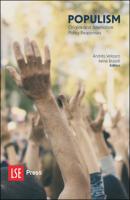Populism
Origins and Alternative Policy Responses
Contributor(s)
Velasco, Andrés (editor)
BUCELLI, IRENE (editor)
Language
EnglishAbstract
Populist movements, parties and leaders have gained influence in many countries, disrupting long-established patterns of party competition, impugning the legitimacy of representative institutions and sometimes actively weakening or coarsening government capabilities. By positing an acute contrast between the will of the people and established elites, and advocating simplistic policy solutions careless of minority rights, populists have challenged the development and even the maintenance of liberal democracy on many fronts.
Social scientists’ attention to populism has grown rapidly, although it remains somewhat fragmented across disciplines. Many questions remain. Are populism’s causes economic or cultural? National or local? Is populism a threat to liberal democracy? If so, what kind of threat? And what can be done about it? Employing a range of conceptual toolkits and methods, this interdisciplinary book addresses in a critical and evidence-based way the most common diagnoses of populism’s causes, consequences and policy antidotes.
Keywords
Democracy; Populism; Identity politics; Liberal democracyDOI
10.31389/lsepress.popISBN
9781909890930, 9781909890923Publisher
LSE PressPublisher website
https://press.lse.ac.uk/Publication date and place
London, 2022Classification
Economics
Political science and theory


 Download
Download Web Shop
Web Shop